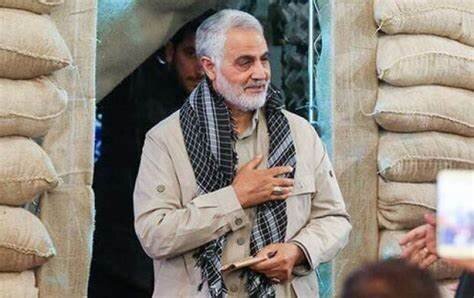Why did Iran send Gen. Soleimani to Syria?
Narratives that must be recounted

BEIRUT – Four years have passed since the assassination of Lt. Gen. Qassem Soleimani. Every time the anniversary passes, an exceptional biography of an exceptional hero comes to mind. He was a hero who devoted his entire life to others and supported the oppressed, standing tall as an impregnable barrier in the face of imperialist ambitions.
Undoubtedly, one of the most important battles Martyr Soleimani led was in Syria against the Takfiri barbarism engineered by Washington and Tel Aviv. In his book “Sobh al-Sham,” Martyr Foreign Minister Hossein Amir Abdollahian explains, at the request of Martyr Soleimani, the details of the Syrian crisis that began in 2011 “so that the young generation can learn about the events in Syria and part of our region, and learn about the heroism of General Soleimani.”
Abdollahian thoroughly explains the motives of Tehran and its allies behind supporting Damascus at that stage: “The reader can clearly see on every page of the book eloquent scenes that reflect the courage of Sayyed Ali Khamenei, the Leader of the Islamic Revolution, and his wisdom in preserving Iran’s security to the maximum extent. The great fingerprints of Gen. Soleimani are also clearly evident in its folds, for those who follow with an eye to the heart.”
Abdollahian explains how these efforts have warded off the victory of the “Western-Arab-Hebrew” coalition against the Syrian people, shedding light on “the events that swept West Asia and North Africa. In parallel, the US-Zionist axis was waiting for opportunities to exploit these pivotal transformations.
“Why did the Egyptians go out and not a single bullet was fired? Why did ISIS not appear in Tahrir Square? Why did this not happen in Tunisia, while events in Syria took a deviant path and turned into a long terrorist war?” Abdollahian wonders
Abdollahian reaches the conclusion: “Other rulers began to think about what they should do” for fear that the revolutions would not shake their thrones. Washington, too, was highly concerned about the fall of its historical and traditional allies one after the other without having a suitable alternative to them.
Nevertheless, the Zionist colonial entity was the most concerned, according to Abdollahian, so after an in-depth study, the Zionist officials deduced that it was necessary to prevent this torrent by implementing a “Reverse Plan”.
Accordingly, they decided to intervene in the Axis of Resistance’s countries. “In the first stage, they wanted to wreak havoc in Tehran ... They have seriously considered targeting Iran’s nuclear centers. They said we must cut off the head of the snake. After searching and examining, they reached the conclusion that this action entails complications, as it is not possible to attack Tehran and come out of the battle without losses,” he notes.
Abdollahian believed that they had no other options but to “cut off the executive arms protected by Iran” such as Hezbollah, Hamas and the Islamic Jihad. At the height of these transformations, the Israeli entity made a wrong decision to wage war against Gaza on November 14, 2012, estimating that Iran was “preoccupied with the nuclear talks and had many problems that prevented it from paying attention to Gaza,” and that Hezbollah’s fighters “who would confront the Israelis had moved to Syria to combat ISIS.”
Israel called its war “Pillar of Cloud,” while the Palestinians called it “The Battle of the Stones of Sijil”. The goal was to destroy the Palestinian resistance’s weapons depots. However, on the 8th day, the colonial occupation regime quickly requested a ceasefire without achieving any results.
Abdollahian adds that the US-Zionist axis found out that among the most important factors that neutralized the scheme to attack Iran and weaken the resistance in Gaza was Syria’s might. Hence, they seriously thought that if they could strike Syria and cut the lines of resistance, the balance of power in the region would fundamentally change. They believed that after the fall of Syria, all routes of sending logistical aid to the resistance movement would be blocked, and the threats facing the Israeli entity in the Golan Heights would be removed.
Foreign Minister Abdollahian says that the goal of this “Reverse Plan” has never changed, which is to weaken the countries surrounding the Israeli entity and their national armies. Unfortunately, what he predicted came true. Syria fell, yet as Sayyed Ali Khamenei has asserted, the courageous Syrian youth – who have been inspired by Martyr Soleimani – will overcome the enemies through steadfastness and sacrifice.
Leave a Comment